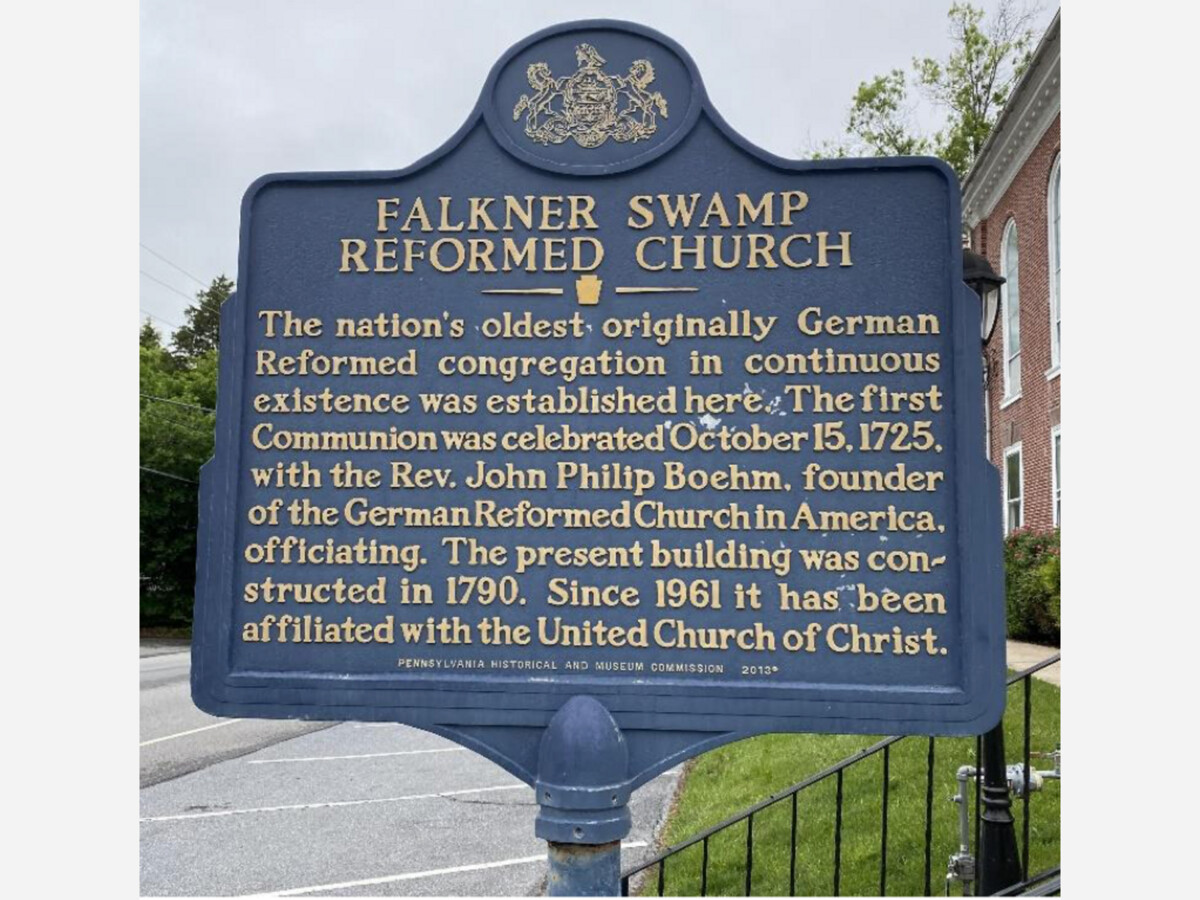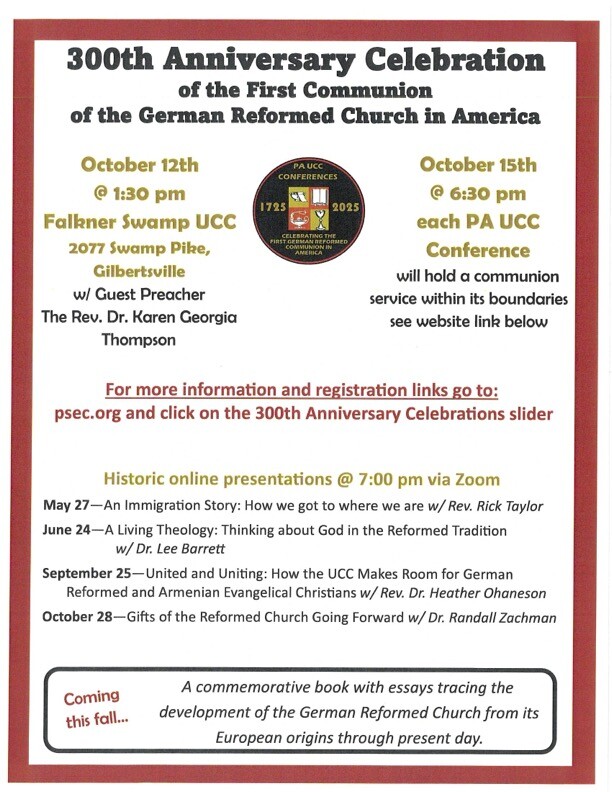Image


by Rev. Bill Worley, Conference Minister of the Pennsylvania Southeast Conference, UCC
This year marks the 300th Anniversary, a momentous milestone, in the life of the German Reformed Church in the United States, one predecessor of the United Church of Christ (UCC), which began with the first recorded Communion service.
A year-long celebration will take place with a series of events that culminate on Sunday, October 12, 2025, at Falkner Swamp UCC, Gilbertsville, PA, where the first celebration of the eucharist took place on Oct. 15, 1725.
Rev. Dr. Karen Georgia Thompson, UCC General Minister and President, will preach and preside, inviting members, friends, and the wider community to join in honoring a legacy of enduring faith, cultural heritage, and sacramental tradition. This celebration of our immigrant heritage is particularly meaningful and instructive given the current conversations about immigration happening around the nation.
To celebrate, a series of events and worship celebrations are planned, including (among other things) quarterly presentations of German Reformed History, a liturgy for congregations to share on the morning of Sunday, October 12, 2025, and a Festival of Celebration on Wednesday, October 15, 2025.
Registration is currently open for these Historic Presentations:
· June 24: A Living Theology: Thinking about God in the Reformed tradition (Dr. Lee Barrett) More info and registration
· September 25: United and Uniting: How the UCC Makes Room for German Reformed and Armenian Evangelical Christians (Rev. Dr. Heather Ohaneson) More info and registration
· October 28: Gifts of the Reformed Church Going Forward (Dr. Randall Zachman) More info and registration
Visit the 300th Anniversary Celebrations page of our website for more information. Historic online presentations @ 7:00 pm via Zoom

The German Reformed Church, rooted in the Protestant Reformation and shaped by the spiritual and cultural contributions of early German-speaking immigrants to North America, held its first documented Communion service in 1725. This sacrament marked the formal establishment of what would become one of the most influential branches of Reformed Christianity on the continent.
To commemorate this tricentennial event, a series of special services, historical lectures, and community gatherings are planned across Pennsylvania and online. A commemorative book will also be published. The Falkner Swamp anniversary service will feature a traditional liturgy with Communion, reflections on the church's legacy, and music drawn from centuries of German Reformed worship traditions. A historical display will highlight artifacts, letters, and records tracing the evolution of the church from its early colonial roots to its present-daypresence across the country.
Three hundred years ago, a community of faith gathered to share in the Lord's Supper. That moment signaled more than just a sacrament-it marked the birth of a church woven into the American story. Today, we honor the courage and faithfulness of those immigrants and the welcome they received as we look ahead with gratitude and renewed purpose.
The German Reformed tradition later became part of the Evangelical and Reformed Church, which merged in 1957 to form the UCC. This anniversary not only honors a historical moment but also invites reflection on the continued relevance of Reformed theology, inclusive community, and prophetic witness in a modern world.
All are welcome to take part in this celebration of heritage, faith, and fellowship. For more information, including a full schedule of events, please visit www.psec.org or contact the Pennsylvania Southeast Conference office.
History: In the 1720s German refugees of the Reformed faith from the Palatinate (the Rhine Valley, north of Switzerland) came to the New World and settled in this area, bringing with them their Bibles, hymn books, catechisms and an unbreakable faith in God. Because of persecution, oppression and famine in the Old World these German emigrants came to Pennsylvania to seek religious freedom. At first, they had no church edifice and worshiped in private homes and barns. Having no minister, they eventually hired a school teacher, John Philip Boehm, to be their lay reader in 1720 to preach and lead their worship.
Boehm, the son of a pastor, was initially reluctant. He was not ordained. Finally, he consented to serve them if the churches organized themselves, developed constitutions and voted as confirmed members. With that grass roots “congregational authorization,” he began to lead communion services. It was not long, however, before later arriving German Reformed pastors attacked Boehm and refused to support his ministry.
Boehm’s congregations did not give up. They asked the Collegiate Dutch Reformed ministers in New York to seek authorization from the Classis of Amsterdam to ordain Boehm. The Dutch Reformed leaders saw that the people “earnestly and unanimously desired” Boehm’s services, and in 1729 Boehm traveled to the very same Collegiate Dutch Reformed church that is now dually affiliated with the UCC and was ordained.
For a time Dutch churches in New York and German churches in Pennsylvania worked together to organize Dutch Reformed and German Reformed churches into two regional Coetuses (what we call Conferences). Later geographic, language, cultural, and economic differences separated the two groups. The Dutch Collegiate churches became part of the Reformed Church in America. The German churches evolved into the German Reformed Church in the United States, and eventually the United Church of Christ. History sometimes yields delightful surprises.
Contributor: Richard H. Taylor
Sign up at www.ucc.org/ucc_roots_sign_up